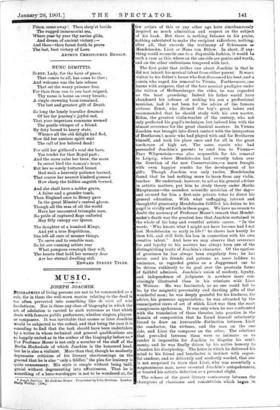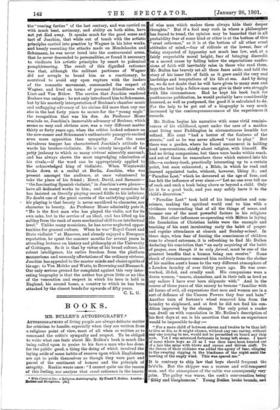MUS I C.
JOSEPH JOACHIM.
• Joseph Joachim. By Andreas Moser. Translated by Lilla Durluun. London Philip Wellby. BIOGRAPHIES of living persons are not to be commended as a rule, for in. them the well-worn maxim relating to the dead is too often perverted into something like de visit; nit nisi laudativum. Nor is there any class of biography in which the art of adulation is carried to such extremes as that which deals with famous public performers, whether singers, players or composers. It was inevitable that sooner or later Joachim would be subjected to the ordeal, and that being the case it is consoling to furl that the task should have been undertaken by a writer in whom technical and general qualifications are so happily united as in the author of the biography before us.* For Professor Moser is not only a member of the staff of the Berlin Hockschule of which Joachim is the honoured head, but he is 'also 'a violinist. More than that, though he modestly deprecates criticism of his literary shortcomings on the ground that he is also "only a fiddler," the plea for leniency is quite unnecessary. His style is simple without being bald, genial :without- degenerating into effusiveness. That he is something of a hero-worshipper is not to be wondered at, for few artists of this or any other age have simultaneously inspired so much .admiration and respect as the subject of his book. But there is nothing fulsome in his praise, nothing calculated to make the recipient ridiculous, nothing. after all, that exceeds the testimony of Schumann oar Mendelssohn, Liszt or Hans von Billow. In short, if any- thing could reconcile one to a disputable fashion, it would be such a case as this, where on the one side are genius and worth, and on the other enthusiasm tempered with tact.
The first point that strikes one about Joachim is that he did not inherit his musical talent from either parent. It was a visitor to his father's house who first discovered his bent, and a cousin who urged his removal to Vienna. Furthermore, one learns with surprise, that of the four musical prodigies under the tuition of Hellmesberger the elder, he was regarded as the least promising. Indeed his father would have abandoned his scheme of making his son a professional musician, had it not been for the advice of • the famous virtuoso Ernst, who divined the boy's great talent and recommended that he should study with his own master, Bohm, the greatest violin-teacher of the century, who not only perfected his pupil's technique, but imbued him with the utmost reverence for the great classical masters. In Vienna Joachim was brought into direct contact with the interpreters of Beethoven's music who had played with and for Beethoven himself, and took his place once and for all in the great torch-race of high art. The same cousin who had persuaded Joachim's parents to send him to Vienna- Frau Witgenstein—was also responsible for his removal to Leipzig, where Mendelssohn had recently taken over the direction of the new Conservatoire,—a move fraught with even happier results for the development of his gifts. Though Joachim was only twelve, Mendelssohn found that he had nothing more to learn from any violin_ teacher. He undertook, however, to act as his general adviser in artistic matters, put him to study theory under Moritz Hauptmann—the soundest scientific musician of the day— and secured for him a first-rate private tutor to direct his general education. With what unflagging interest and thoughtful generosity Mendelssohn fulfilled his duties to his pupil is vividly set forth in these pages. We have no reason to doubt the accuracy of Professor Moser's remark that Mendel- ssolm's death was the greatest loss that Joachim sustained in the whole of his long and eventful artistic career. "In the words, 'Who knows what I might not have become had I not lost Mendelssohn so early in life ? ' he shows how keenly he then felt, and still feels, his loss in connection with his own creative talent." And here we may observe that reverence for and loyalty to his masters has always been one of the distinguishing traits of Joachim's character. Of the egotism of greatness he has always been singularly free; he has never used his friends and patrons as mere ladders to eminence, or regarded genius as a Juggernaut car to be driven ruthlessly to its goal over the prostrate forms of faithful admirers. Joachim's union of modesty, loyalty, and independence of judgment is nowhere more con- vincingly illustrated than in his relations with Liszt at Weimar. He was fascinated, as no one could fail to be, by the magnetic personality and dazzling gifts of that wonderful man; he was deeply grateful for his kindness, his advice, his generous appreciation; he was attracted by the emancipated views of art of which Liszt was then the most conspicuous spokesman. It was only when he was confronted with the translation of those theories into practice in the domain of composition that he found himself reluctantly forced to draw an irrevocable distinction between Liszt the conductor, the virtuoso, and the man on the one side, and Liszt the composer on the other. The relations that prevailed between them were so intimate as to render it impossible for Joachim to disguise his senti- ments, and he was finally driven by his native -honesty to abandon his discipleship. The letter in which he delivered his mind to his friend and benefactor is instinct with regret- ful candour, and so delicately and modestly worded, that one is not surprised to learn that Liszt, who was essentially a magnanimous man, never resented Joachim's outspokenness, or treated his artistic defection as a personal slight.
The echoes of the great literary controversy between the champions of classicism and romanticism which began in the "roaring forties" of the last century, and was carried on with much heat, acrimony, and ability on both sides, have not yet died away. It speaks much for the good sense and tact of Joachim, that while out of touch with the artistic principles carried into practice by Wagner in his later works, and keenly resenting the attacks made on Mendelssohn and Schumann, he was never lured into the controversial arena, that he never descended to personalities, or found it necessary to vindicate his artistic principles by resort to polemical pamphleteering. The result of this dignified reticence was that, although the militant partisans of Wagner did not scruple to brand him as a reactionary, he contrived to avoid any open rupture with the leaders of the romantic movement, commanded the respect of Wagner, and lived on terms of personal friendliness with Liszt and Von Billow. The service that Joachim rendered Brahms was unique : he not only introduced him to Schumann, but by his masterly interpretation of Brahma's chamber music and unflagging advocacy of his claims did more than any one else in the last forty years to secure for the "young eagle" the recognition that was his due. As Professor Moser reminds us, Joachim's immovable advocacy of Brahms, which seems so easy and obvious now, was a very different matter thirty or forty years ago, when the critics looked askance on the new-comer and Schumann's enthusiastic panegyric excited even more opposition than sympathy. Just the same chivalrous temper has characterised Joachim's attitude to- wards his brother-violinists. He is utterly incapable of the petty jealousy to which so many virtuosi miserably succumb, and has always shown the most ungrudging admiration of his rivals,—if the word can be appropriately applied to the acknowledged king of violinists. When Wieniawski broke down at a recital at Berlin, Joachim, who was present amongst the audience, at once volunteered to take the place of his friend ; Ernst, David, and Sarasate- - the fascinating Spanish violinist," in Joachim's own phrase— have all dedicated works to him ; and on many occasions he has insisted on literally playing second fiddle to his inferiors. No doubt one of the great secrets of the satisfying quality of his playing is that beauty is never sacrificed to character, nor character to beauty. As Professor Moser admirably puts it, "He is the first man who has played the violin, not for its own sake, but in the service of an ideal, and has lifted up his calling from the rank of mere mechanical skill to an intellectual level." Unlike many musicians, he has never neglected oppor- tunities for general culture. When he was" Royal Court and State violinist" at Hanover, and already enjoyed a European reputation, he spent the summer months for several years in attending lectures on history and philosophy at the University of Gottingen. So it is that by virtue of his broad culture, his robust intelligence, his entire freedom from the platform mannerisms and unmanly affectations of the ordinary virtuoso, Joachim has appealed to the master minds and choice spirits of his age: to Von Moltke and Watts, to Browning and Bismarck. Our only serious ground for complaint against this very inter- esting biography is that the author has given little or no idea of the veneration and respect in which his hero is held in England, his second home, a country to which he has been attached by the closest bonds for upwards of fifty years.
C. L. G.



















































 Previous page
Previous page